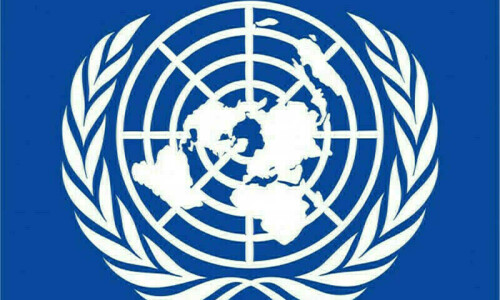ISLAMABAD: A unilateral decision by the health ministry to ban the prescription of nutraceuticals, also known as dietary supplements, will impact the welfare of patients, said medical experts.
The blanket ban on the prescription came after the health ministry was asked to fix the prices of these products amid their excessive use and take action against medical professionals who were prescribing nutraceuticals unnecessarily. The ministry had sent a summary to the federal cabinet, requesting a blanket ban on health professionals from prescribing nutraceuticals.
The summary was approved by the caretaker federal cabinet and a notification prohibiting the prescription of vitamins, multivitamins, minerals, food supplements, nutritional products and over-the-counter products.
“...the Pakistan Medical and Dental Council (PMDC) has been directed to prohibit the prescription of all vitamins, multi-vitamins, minerals…by all physicians/doctors/medical and dental practitioners and to take all necessary steps forthwith including amendment, if any, in code of practice and ethics for the medical and dental practitioners under section 47 of PMDC Act, 2023,” a notification issued by the ministry stated.
The notification also directed all provincial health departments and the Islamabad Capital Territory Administration to prohibit dispensing of the above-mentioned products at medical stores and take all necessary steps to ensure that these products are sold over segregated and self-service shelves along with products of personal/healthcare.
Moreover, Drap has been also directed to register or enlist vitamins, multivitamins, minerals and health and over-the-counter products according to best global practices.
The decision drew a cautious response from the Pakistan Pharmaceutical Manufacturers Association’s former Central Executive Committee (CEC) member Usman Shaukat.
“Food supplements, multivitamins, and nutritional products are also part of a patient’s therapeutic treatment and it is a global practice where the lack of benefit of certain allopathic drugs or concern of potential side effects prompts physicians to prescribe food supplements as an alternative. Also at times, these nutritional products are prescribed as a supportive therapy for patients coupled with allopathic drugs,” he said.
“The recent order passed by the government prohibiting physicians from prescribing such food supplements and nutritional products would negatively impact the patient’s welfare... As an industry, we believe that a cautious approach should be adopted when prescribing such supplements as there are some indications of abundant prescriptions… However most doctors are not following such practices…,” he said.
Mr Shaukat suggested that there should be a check and balance mechanism on such prescriptions to avoid their misuse; however, a complete ban on the prescription of these products was not the solution.
“In Pakistan allopathic and pharmaceutical products cannot be advertised on print, electronic or social media and thus the only way to educate patients about these products is via doctor prescriptions. However, food supplements and multivitamins are advertised on mainstream media as well as social media thus patients are being marketed these products actively which may also lead to overuse. It would be more prudent to devise a list of food supplements and multivitamins that are essential for patient welfare and allow for such products to be prescribed,” he said.
“A collective consultation process…should be adapted to make the legislation effective in its letter and spirit to achieve the goal of patient welfare,” Mr Shaukat suggested.
The Pakistan Medical Association also criticised the decision and said the prescription of such products was already regulated through existing guidelines. In a letter to the prime minister, PMA Secretary General Dr Abdul Ghafoor Shoro said that by restricting physicians from prescribing these supplements, the aforementioned notification “undermines the professional autonomy and expertise of doctors”.
“We also call upon the ministry to prioritise evidence-based medicine and consult with experts before making such decisions that directly affect patient care,” he added.
A pharmaceutical expert Dr Ayaz Kiani, while talking to Dawn, said there was a need to rationalise the prescription of nutraceuticals but a complete ban was not the solution. “...across the globe, that nutraceuticals are prescribed irrationally but in countries like Pakistan…focus should be on prescribing essential medicines rather than nutraceuticals,” he suggested.
Published in Dawn, February 18th, 2024












































Dear visitor, the comments section is undergoing an overhaul and will return soon.